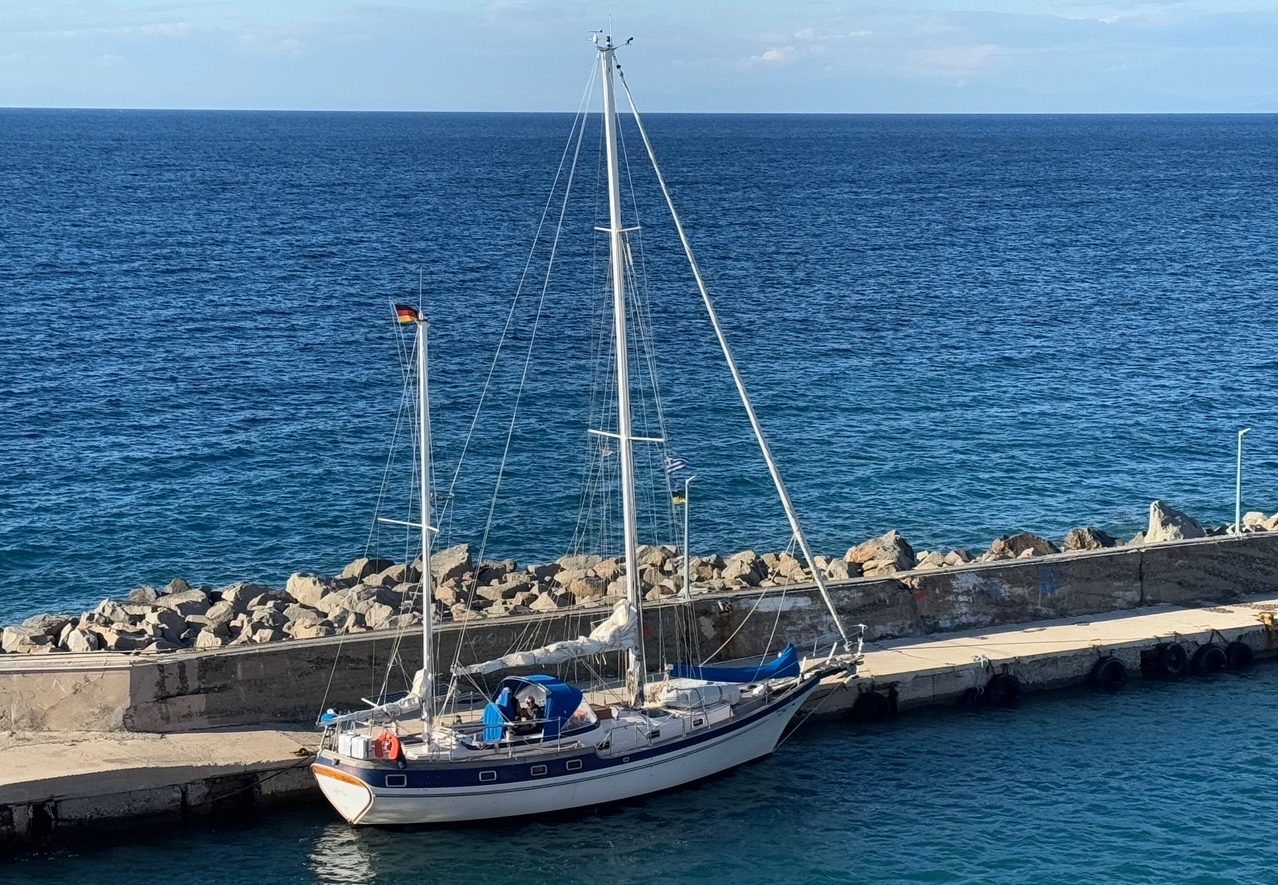We took a few days to see Kerkyra and visit the beautiful park and Monrepos Castle on the outskirts of the city.
On 23 May, we made our way north. We had already seen Saranda, the southernmost city in Albania, from our boat over the last few weeks. It is only a few nautical miles away from the northern tip of Corfu.
When travelling to Albania, you have to register with the authorities and clear in. Albania is not part of the EU, but is a candidate country. You need an "agent" to clear in. Sounds a bit like James Bond. We had already contacted Jelia from Corfu the day before we arrived in Saranda. She got us a place at the customs pier and took care of all the formalities for us. Very pleasant. And we were even allowed to stay for two nights. However, our berth took a bit of getting used to: right next to a large ship that was being repaired. And a ferry moored directly over our anchor chain overnight. It manoeuvred very carefully, so we didn't have to worry.
Saranda is a lively, large town, totally built up, with lots of bars and restaurants on the waterfront. Jelia got us a hire car for the day. This meant we could visit Butrint and drive through the mountains to Gyrokaster.
Butrint and Gyrokaster
Ancient Butrint is the most visited archaeological site in Albania and is a UNESCO World Heritage Site. We were not only impressed by the walls and buildings dating back almost 2500 years (from the Greek colonists to Ali Pasha). We were also impressed by its location on a small peninsula between Lake Butrint and the Vivar Canal. A fantastic lagoon landscape with views as far as Corfu and the mountains.
We drove over a spectacular pass road into the Drino Valley to the Ottoman town of Gyrokaster. This is also a UNESCO World Heritage Site. The town with its narrow, steep alleyways is built on three mountain ridges. The former dictator Enver Hoxha was born here. Back from all the sightseeing, a little bit tired we sat in our cockpit in the evening, parked between the ferries.
A brief excursion into history: Ali Pasha
Ali Pasha (probably 1740-1822) is often encountered in Greece and Albania. He came from Albania and was the head of a gang of thieves for 20 years, which he then betrayed to Sultan Mahmut II. This earned him the Sultan's favour and he was entrusted with ruling (what is now) northern Greece, Albania and northern Macedonia for the Ottoman Empire.
He was known and infamous for his extremely brutal rule and the execution of thousands of Greeks and Albanians who refused to convert to Islam.
Ali Pasha was also a power-conscious politician who attempted to mould the area he ruled into a state of his own. His army comprised 100,000 men at times. He ruled over Epirus, southern Albania, Thessaly and south-western Macedonia, which ultimately proved to be his undoing: He was murdered by order of the Sultan, his head was taken to Constantinople, preserved with salt and exhibited there.
What you can still see of him today are many fortifications in exposed locations, often built on Venetian foundations and displaying impressive, state-of-the-art military architecture for the time.
Port Palermo
Port Palermo, 17 nautical miles north of Saranda, was our next destination. As we entered the well-protected bay, we were curious to see whether we would even be allowed to moor at the very high concrete pier. Port Palermo used to be a military base with a submarine bunker. The northern part is still a military area. In the southern part, you can anchor in very deep water or go to the old pier. However, we had read from other sailors that they were sent away again. Mooring at the pier was not easy at all and only worked with a very sporty climb to the top. And fixing the boat wasn't easy either, as there are very few bollards. But we managed it. And we were lucky: the police allowed us to stay after they had photographed all our documents and inspected our boat.
There is a beach, a restaurant and an Ali Pasha castle in the beautiful bay. A great place and also really well protected. We realised this when a thunderstorm raged over us during the night. We will stay another night.


































